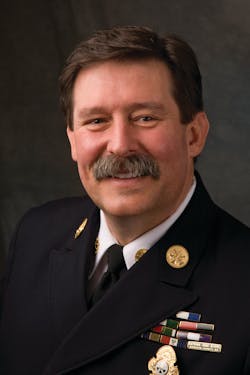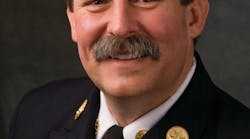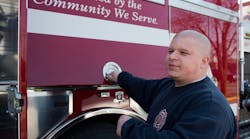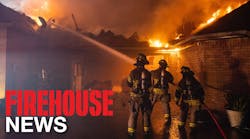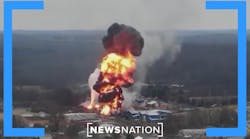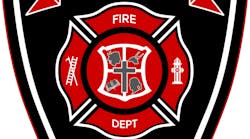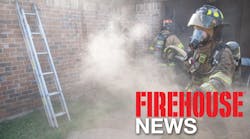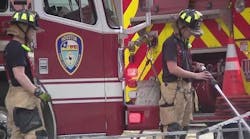Last month, I took a look at the three most important court decisions that affected the U.S. fire service in 2011. This month, I focus on what I consider the year’s most interesting and bizarre legal stories. For me, the important cases are those that set or affirm important precedents that impact hundreds if not thousands of firefighters, while the interesting cases are those that capture our attention and the bizarre cases – well, let’s just say “you can’t make this stuff up!”
The most interesting
To me, these are the most interesting cases from 2011:
• Hawley v. Cyphers was a civil action brought by a paralyzed firefighter from the Warrior Run Area Fire Department in Pennsylvania against the arsonist who set the fire where his injuries occurred. Wayne E. Hawley Jr., 54, was paralyzed in 2007 while battling a fire that was set by a former firefighter, Chester A. Cyphers, 55. Cyphers is believed to have set as many as 60 fires between 2004 and 2008.
The case was tried before Judge Charles H. Saylor, who awarded $7.54 million to Hawley and $2.5 million to his wife. As important as the verdict was, it will remain a largely symbolic victory: Cyphers has no assets from which the judgment can be paid.
• The second case, Carroll v. City of Mount Vernon, was a U.S. 2nd Circuit Court of Appeals decision in a reverse-discrimination case brought by a white firefighter from Mount Vernon, NY. Joseph Carroll took a lieutenant’s exam in 2004 and ranked ninth on the list. The list was good for two years, and due to expire in 2006. Development of a new promotional list was delayed, so the expiration date of the 2004 list was extended to July 19, 2007.
By 2007, Carroll ranked second on the lieutenant’s list. A new test was finally administered on March 24, 2007, to replace the old list. Carroll’s new rank on the list was 16th. As the expiration deadline for the 2004 list approached in July 2007, there were two lieutenant vacancies that needed to be filled. Carroll and another white firefighter, Justin Chase, were under consideration and were granted interviews with the mayor. The Vulcan Society intervened and contended that the extension of the old list from 2006 to 2007 violated a consent decree that the city agreed to. The city opted to move the effective date of new list up to July 9, 2007, and let the deadline pass without making the promotions. That decision prompted Carroll’s suit alleging reverse discrimination.
The trial court ruled against Carroll in 2010, finding he could not prove that the city’s motivation was race-based. On appeal, the 2nd Circuit agreed, concluding that Carroll “offered no evidence that the city’s decision to accelerate the effective date of the 2007 list was made after the Vulcan Society threatened to bring litigation if the 2004 list were used…Indeed, the only reference in the record to acceleration of the effective date of the 2007 list…suggests that the decision to accelerate it from July 19 to July 9 or 10 was made before the Vulcan Society threatened litigation.”
• The third case, a criminal case out of Velarde, NM, arguably could qualify under the bizarre category. On March 29, 2011, Fire Chief Eddie Velarde was the incident commander at a sizeable wildland fire. Rio Arriba County Sheriff’s Lieutenant Adam Archuleta responded to the scene and claims that Velarde was “creating general hysteria at the scene that was doing more harm than good.” He then arrested Velarde on charges of disorderly conduct.
The parties disagreed on the status of the fire at the time of the arrest. Archuleta claimed that the fire was out, and crews were only on scene another 10 minutes following the arrest. Velarde disputed that, claiming he was arrested, taken to the sheriff’s office, booked, released and returned to the scene while crews were still there.
While being processed, Archuleta claimed Velarde was uncooperative, so he charged him with concealing his identity and obstructing a sheriff’s officer. Velarde denied both the allegations and claimed the two later charges were the result of law enforcement officials transposing one number each on his birth date and social security numbers. The story made headlines across the country and portrayed Velarde in a very poor light. It also raises some serious questions that the National Incident Management System’s Incident Command System does not seem to address.
The case came to trial in July 2011 and Velarde was exonerated of all three charges. According to the chief’s attorney, Diego Zamora, the chief plans to sue Archuleta and the county for false arrest and malicious prosecution. Statutory notice of intent to sue has already been submitted with county officials. This will be a good case to watch in 2012.
The most bizarre
Here are my choices for the most bizarre cases of 2011:
• In re Estate of Thomas Araguz involved the line-of-duty death of Wharton, TX, Fire Department Captain Thomas Araguz III and stands as one of the most bizarre fire service cases in history. Araguz died on July 3, 2010, at a structure fire, leaving an estranged wife, Nikki Araguz, and two children from a prior marriage.
A dispute arose between Nikki and Araguz’s family over the $600,000 in survivors’ benefits due to the fact that Nikki was transgendered. Judge Randy Clapp held that the marriage between Araguz and Nikki was void under Texas law because Nikki was born a man. As a result, the survivors’ benefits were awarded to the firefighter’s children, not Nikki. The ruling made it unnecessary for the court to consider an even more contentious issue: whether Araguz knew his wife was transgendered when he married her or whether (as his mother and ex-wife allege) he was the victim of fraud. The case is currently being appealed.
• Otter v. Frenchtown Township et al involves a suit brought by the driver of a pickup truck in Michigan who rounded a corner at a high rate of speed and slammed into the back of a fire truck parked at the scene of a previous accident. The accident was caught on a police car’s dashcam and showed Otter’s vehicle traveling too fast for conditions.
Otter had to be extricated from his pickup and was flown by helicopter to a trauma center. He sued the township and one of the firefighters who helped to save his life, claiming they were responsible for the accident.
An investigation revealed that Otter had a long record of driving infractions and should not have even had a license. He was observed by a TV news crew to be feigning injuries that he claimed were attributable to the accident. Court documents also revealed that he had high levels of drugs in his system at the time of the accident that would have impaired his driving. Despite all this, the case was settled by the township and its insurer for $47,000 prior to trial. Under the settlement, $20,000 would be placed in a trust fund for Otter’s children and $27,000 would go to Otter’s attorneys. The settlement agreement stipulated that Otter himself would receive nothing.
The Otter case shares some similarities with the first runner up for most bizarre, a case out of Colorado where a convicted arsonist, Joel Ledermann, filed a notice of intent to sue 13 fire agencies, the Colorado State Forest Service and the cities of Loveland and Fort Collins, all of whom responded to the fire he set. Ledermann was a property owner whose careless burning led to the 750-acre “Reservoir Road Fire” that destroyed two homes and cost over $3 million to battle. He pleaded guilty to fourth-degree arson and was sentenced to three years of unsupervised probation and 450 hours of community service. According to his lawyer, Ledermann believes the firefighters responded too slowly and used questionable tactics.
Conclusion
These two columns on the most important, interesting and bizarre cases from 2011 offer us a glimpse into the fascinating world of fire service law. By necessity, the case descriptions offer merely an overview of what occurred. Each case has so many more facts, more issues and more lessons for firefighters to know and understand. I don’t know about you, but I cannot wait to see what 2012 will bring us.
For more news about fire service law, visit: http://www.firehouse.com/topics/politics-law.
